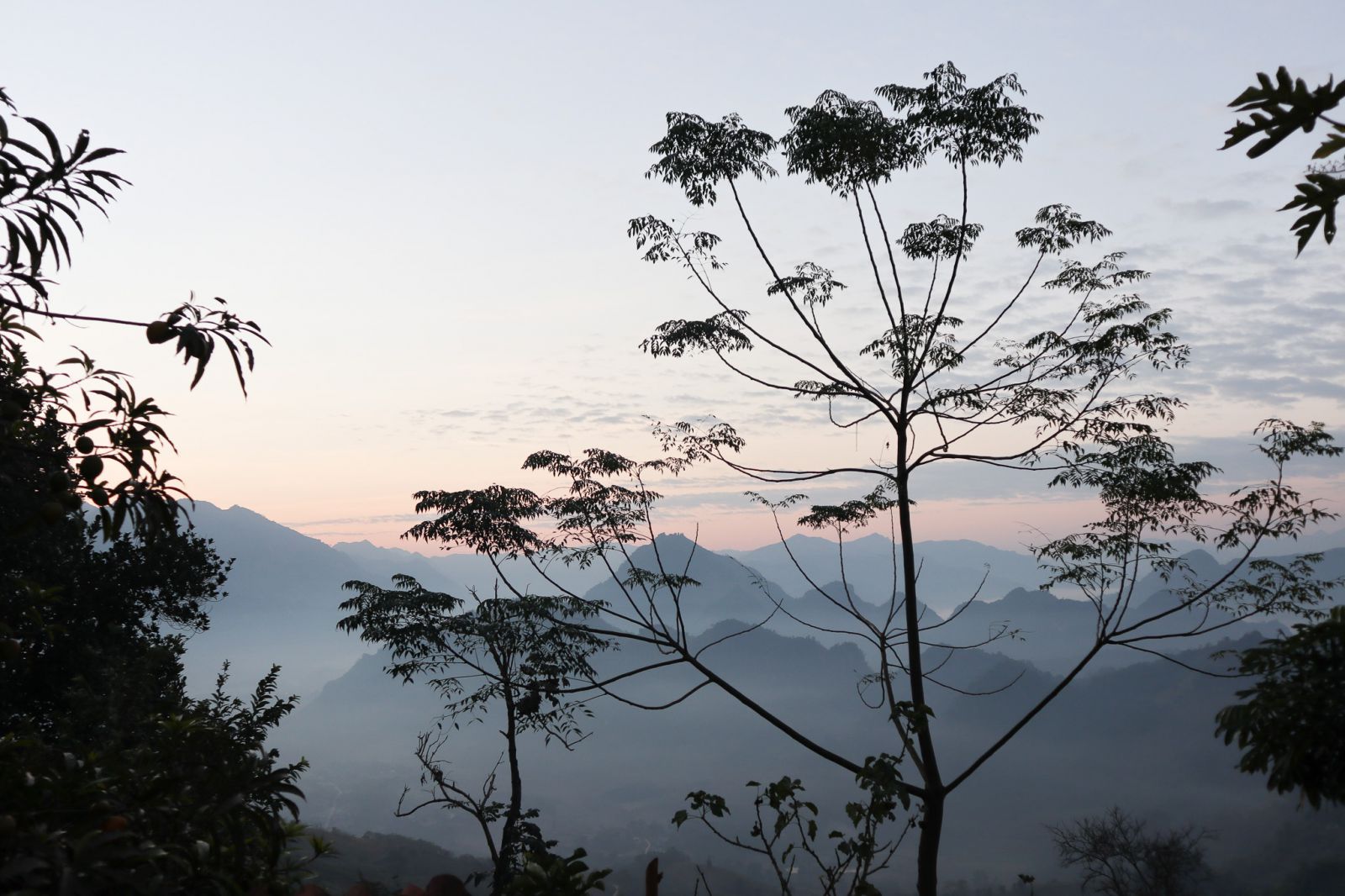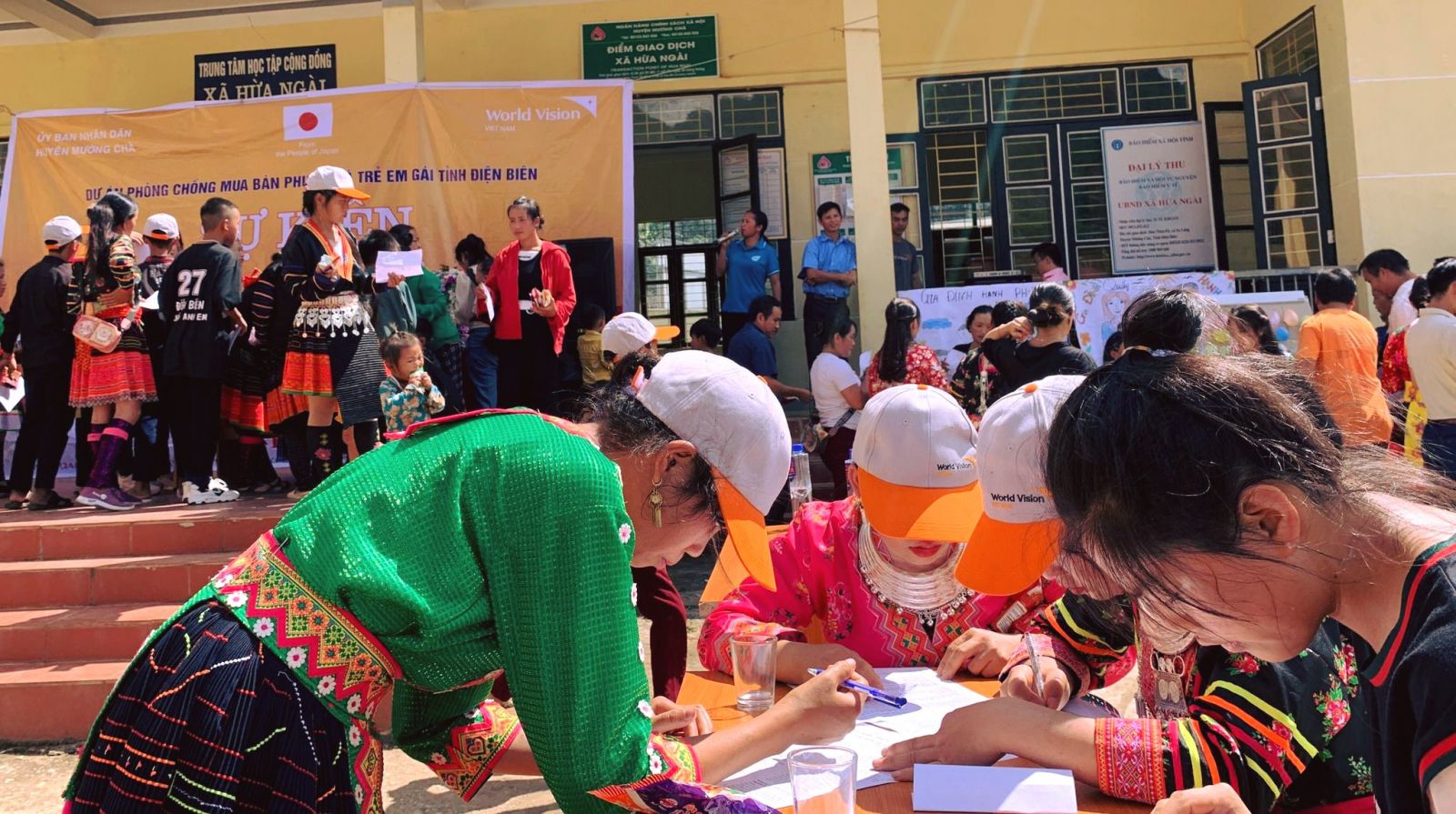(Name of the survivors and their families have been changed)
“I kept telling my Chinese husband, ‘I have two kids at home, and no one is taking care of them. I have to come back, even if you let me or not.’ Pleading and crying, I did it all,” Thanh recalled with a raspy and quick voice. Even then, sitting safe and sound among her Women’s Club fellows and sharing her arduous journey, Thanh still could hardly believe that she was really home.
Thanh was lucky to return one year after being tricked and sold to become a Chinese man’s wife.
Rightful dream for a better life
One of Mường Chà’s (Điện Biên province) poorest communes, almost 75% of the households in Sa Lông were classified as poor (2016). As Sa Lông was only a few hours away from Laos and China’s border, many people flocked away to find better opportunities on the other side. In mid-2018, Thanh and her husband decided to follow “the wave” to China for seasonal jobs, hoping to better provide for their two sons. The couple would do whatever jobs without any contract, from cleaning to portering at construction sites. After deducting all the expenses, they brought back more than 20 million dong per month – ten times more than what they would make from foraging and farming.
“Because the pay was too good, people accepted all the poor conditions like chemical exposure, beating, and overworking,” Ms. Hoa, Project Coordinator of World Vision Việt Nam’s Human Trafficking Prevention for Women and Girls (HTPWG) project, observed. “However, five out of the six cases I know came back with serious health issues, and one even passed away shortly.” And Thanh’s husband was no different. After almost a year of working in China, his health worsened, forcing the couple to head back. Just after three months, Thanh’s husband passed away.
Misplaced Trust
Still grieving, Thanh came back to work in a small town in China near the Lào Cai Border in early 2019. There, she befriended Sang and her husband, a Vietnamese-H’Mông couple also from Mường Chà. One day, they got a call from Tủa, a young friend from home, inviting them to a birthday dinner. After some fun talks, Tủa suggested they go to a karaoke bar. The girls agreed and got in a taxi with Tủa and his friend, Phèo. It turned out that there was no karaoke bar. The cab took them to a remote, dark road. The two men quickly grabbed Thanh and Sang before they could put on a fight and forced them to go with two Chinese men who drove them to a shack deep in the forest.
Victims like Thanh and Sang were not uncommon in Điện Biên province, especially in Mường Chà, Mường Nh—Nậmm Pồ, and Tủa Chùa – the province’s four border districts. “Since 2017, there have been more than 300 reported missing people in Điện Biên province, most of them women and girls suspected of being victims of human trafficking. By living among the community and taking advantage of the local people’s limited social access and resources, traffickers approach the victims, especially women of ethnic minority groups, in their circle or social media.” – Major Hoàng Văn Dân, Vice Captain of Criminal – Economic – Drug Team, Mường Chà District Police Department.
The lonely nightmare
Thanh and Sang spent the night in the shack but almost got no sleep. Thanh woke up to see Sang curling up in a corner and shaking, saying that she was feeling sick. Sang asked if the men could get them anything to eat, as it might help her get better. After some negotiations, the men agreed, but on the condition that one girl must go with them, so Thanh did. By the time they got back, Sang had already escaped. Now, Thanh was all alone once again.
What happened next was a blur to Thanh. She was transferred between hiding places as her traffickers waited for higher bidders. The whole time, Thanh numbly followed the men’s orders because they told her that if she disobeyed, they would kill her. Eventually, after one month, a Chinese man in Changsha, Hunan - 1,800 kilometers away from where the girls were tricked, brought Thanh at 70,000 yuan (around USD 10,000) to be his wife.
A persistent will
Every day, Thanh would go to work in the field with the Chinese man and his mother and then come back to a locked house to do chores and take care of his 9-year-old child. Communicating with her “new family” only by body language, Thanh felt extremely lonely. “After a while, I found some Vietnamese wives who were also sold to this neighborhood, and they comforted me, saying that all had been done now, so we should focus on our new families and stick together. But all I could think of was going back to my boys”, Thanh recounted.

Not being able to communicate and not hearing anything from her sons, Thanh felt extremely lonely.
Up to 2019, there were about 100,000 Vietnamese brides in mainland China, but only half of them were in a legal marriage. Due to China’s serious gender imbalance, many Chinese men have to turn to marriage agencies, many of which are associated with traffickers, to find wives from neighboring countries. Most of such marriages happened in poor rural areas, and those brides were often without documents, making them entirely dependent on their husbands and vulnerable to mistreatment.
One day, as both her Chinese husband and mother-in-law were out, Thanh sneaked out and called a taxi. With her botched Chinese, Thanh asked the driver to take her to the nearest police station. The car circled around for a while and then came right back to the house. Turned out, the quiet driver was too familiar with runaway brides like Thanh and did not want to get into trouble with the traffickers. Thanh felt like all her hopes were just shattered.
Although Thanh was not beaten for the failed attempt, they took away her phone and outdoor “privileges” and locked all the doors, isolating Thanh from her restricted world. Thanh cried to her husband: “I have to come back to my sons, whether you let me or not. You can keep me here for now, but I will get out eventually.” The next couple of weeks, she continued her persistent pleas and even starved herself in protest. Finally, the Chinese man gave in and called the police for Thanh.
The long journey back
When she was finally back in Việt Nam in November 2019, Thanh could not believe almost a year had passed. “Once I set foot on Việt Nam’s soil, I don’t feel scared or worried anymore. I could finally breathe,” Thanh recalled. She later reunited with Sang, and they both reported Tủa and Phèo to the authority and testified before the court.
Although it seemed like Thanh’s story had ended on a happy note, the rough path for returnees just began. Many female survivors experienced sexual abuse and were forced illegal work during their captures. Such situations, even though through no faults of their own, create stigmas and blames on the victims due to deeply-held traditions and misogyny. For Thanh, her pretty look and wits seemed more like a curse when people spread rumors about her being a “working girl” during her time in China, which made it all the more difficult for her to reconnect with her old life. Her mother-in-law wanted Thanh to move out but would not let her take the kids. Thanh felt stuck.
Getting information about Thanh’s case, World Vision Việt Nam quickly registered her in support programs and provided her with sand, concrete, and cement boards to build a single-story house just one hill over her in-laws’, making it easy for her to co-parent her sons. But having little to start over with, Thanh, once again, had to leave her children for their paternal grandmother and find work in a textile factory in Hải Phòng.
“In Mường Chà, the severe cold and limited farmland make farming challenging. So, in many cases, returnees like Thanh still leave to work outside. Understanding their difficulties, we try to keep accompanying them in any way we could, such as connecting them to safe job opportunities and bringing their children under our supervision,” Ms. Hoa, HTPWG Project Coordinator, shared. Hence, while Thanh was away, her sons, Chung and Oánh – aged 7 and 4, were registered into World Vision’s Timed and Targeted Counseling model so that the Organization could monitor their well-being while keeping up with Thanh’s updates. Thanks to the model’s nutrition recommendations and interventions, Chung and Oánh gradually reached their standard developmental milestones, which kept the boys away from seasonal diseases that used to put them in the hospital for days.
 Job fairs to find safe openings and communication sessions on human trafficking prevention are among World Vision Viẹt Nam's efforts to reduce the community's vulnerability against the risks and trickeries of traffickers.
Job fairs to find safe openings and communication sessions on human trafficking prevention are among World Vision Viẹt Nam's efforts to reduce the community's vulnerability against the risks and trickeries of traffickers.
When COVID-19 happened, Thanh and hundreds of others had to come back to Mường Chà. To help her settle down, World Vision Việt Nam brought Thanh the Ultra Poor Graduation program, a model that provides the most vulnerable households with essential resources to help them develop sustainable livelihoods. Through the Program, Thanh received two breeding goats, along with husbandry training, animal feed, and building materials, to set up her own barn.
With World Vision’s persistent and nonjudgmental companionship, Thanh and Sang gradually became more comfortable participating in the Human Trafficking Prevention for Women and Girls project’s meetings and events. Together, they shared their cautionary tale with other women and girls with the hope of saving others from the many traps and trickery of human traffickers. “I think anyone could be caught off guard and become a victim of traffickers. I feel respected and valued when my story can help other women and girls can protect themselves and also for the community to better sympathize with our situations,” Thanh shared.
.jpeg)
Joining the Women's Club, Thanh felt valued and sympathized for her experiences. Hence, she wanted to share her stories to help others protect themselves from the trickery of traffickers.
“My dream is to be with my children right here.”
“Mom, hurry up!” The boys called out to Thanh while swiftly leading the way to the barn, where they kept the goats. “That one is going to give birth soon,” – one of the boys pointed excitedly. Thanh looked at her sons affectionately and offered a wry smile. As factories were returning to pre-COVID operations, Thanh would leave soon for Hà Tĩnh, but her boys hadn’t known it yet. “It will only be temporary because my dream is to be with my children right here,” Thanh spoke softly to World Vision officers. There would be a lot of uncertainties ahead, but she knew that here, she had families and friends – like World Vision Việt Nam – to look out for her and her sons.

Thanh's sons (7 and 4) excitedly show the way to their goat barn. The goats and barn were within World Vision Việt Nam's interventions to help returnees and at-risk members like Thanh strengthen their financial stability.
Điện Biên is one of the “hot addresses” for human trafficking in Việt Nam and the Mekong Delta Region. Through Area Programs and special projects, such as Ending Violence Against Children and Human Trafficking Prevention for Women and Girls (HTPWG), World Vision Việt Nam is working closely with government agencies and communities at grassroots levels to address the issue. World Vision Viet Nam commits to walking alongside the communities, especially the at-risk individuals and survivors, to enhance their awareness about the problem, foster behavioral change, and equip them with the necessary tools to secure and improve livelihoods, thus contributing to addressing the root cause of human trafficking. Between 2018 and 2019, World Vision Việt Nam helped rescue 33 victims from China and supported 40 female victims with livelihood interventions to help them reconnect with their community and start a new life.

